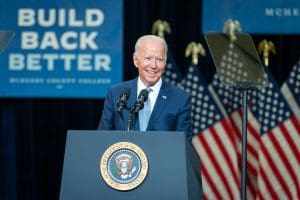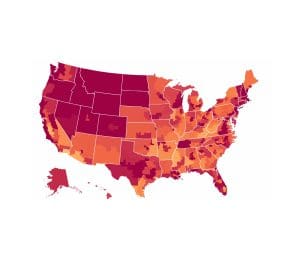The economic crisis caused by the coronavirus pandemic poses a triple challenge for tax policy in the United States. Lawmakers are tasked with crafting a policy response that will accelerate the economic recovery, reduce the mounting deficit, and protect the most vulnerable.
To assist lawmakers in navigating the challenge, and to help the American public understand the tax changes being proposed, the Tax Foundation’s Center for Federal Tax Policy modeled how 70 potential changes to the tax code would affect the U.S. economy, distribution of the tax burden, and federal revenue.
In tax policy there is an ever-present trade-off among how much revenue a tax will raise, who bears the burden of a tax, and what impact a tax will have on economic growth. Armed with the information in our new book, Options for Reforming America’s Tax Code 2.0, policymakers can debate the relative merits and trade-offs of each option to improve the tax code in a post-pandemic world.

Survey Shows Growing Tax Complexity for Multinationals
New data clearly points to an increase in tax complexity for multinationals in the OECD as well as globally. The OECD’s ongoing efforts to reform the international tax system will likely further add complexity to the international tax environment.
3 min read
North Carolina Considers Corporate Income Tax Repeal and Individual Income Tax Relief
Taken together, the proposed reforms would further solidify North Carolina’s position as a leader in sound tax policy and as a state whose tax code is among the most conducive to generating long-term economic growth.
7 min read
Illuminating the Hidden Costs of State Tax Incentives
In most states, tax incentives abound, usually offered as a way of promoting new investment or attracting certain industries by shielding them from the full impact of otherwise high tax rates.
6 min read
Intellectual Property Came Back to U.S. after Tax Reform, but Proposals Could Change That
Intellectual property is a key driver in the current economy. Among other things, intellectual property includes patents for life-saving drugs and vaccines and software that runs applications on phones and computers.
5 min read
Households Earning $75,000 or Less Paid Majority of Individual Mandate Penalties
Last month, the Supreme Court turned back a challenge to the Affordable Care Act (ACA), allowing to stand the Individual Mandate it created that penalizes taxpayers for not having proper health insurance and opening the way for President Biden and Congress to reimplement it.
2 min read
Dynamic Scoring of Infrastructure Spending Proposals Offsets Small Portion of the Cost
While it is good that policymakers are taking the impact of the economy on tax revenue seriously, it is important to remember that the dynamic effect of increased spending would only offset a small portion of the total spending. In other words, new spending—like tax cuts—rarely pays for itself.
3 min read
How Biden’s Business Tax Proposals Would Impact Taxpayers Across States
The Biden administration has targeted U.S. businesses, including corporations and passthrough entities, to raise revenue to fund new spending. However, individual taxpayers across America will end up footing the bill.
4 min read
IRS Sends Nearly $15 Billion of Advance Child Tax Credit Payments
New Treasury Department data released on the advance Child Tax Credit payments shows the distribution by state, including how much, on average, households in each state received. The expansion will only be in effect for the 2021 tax year—if policymakers wish to continue providing the increased benefits, they must address the administrative and revenue costs of the policy.
4 min read
Cutting the Cord from Cable Has States Courting New Revenue Streams
If states wish to tax digital streaming and download services, they should do it the right way, by including them in their sales tax base—preferably as part of broader reforms paired with commensurate rate reductions—rather than inventing new excise taxes or shoehorning taxation of the new economy into outdated statutes.
4 min read
Even Within States, Tax Treatment Differs by Industry
States can enhance tax neutrality across industries by reforming tax structures that penalize certain business activity, leaning less on generous incentives, and focusing more on creating a tax code that provides for low and competitive burdens for all comers.
5 min read